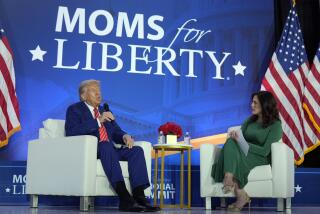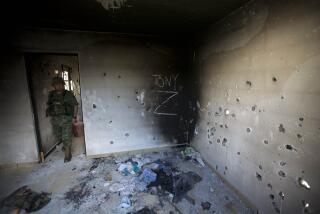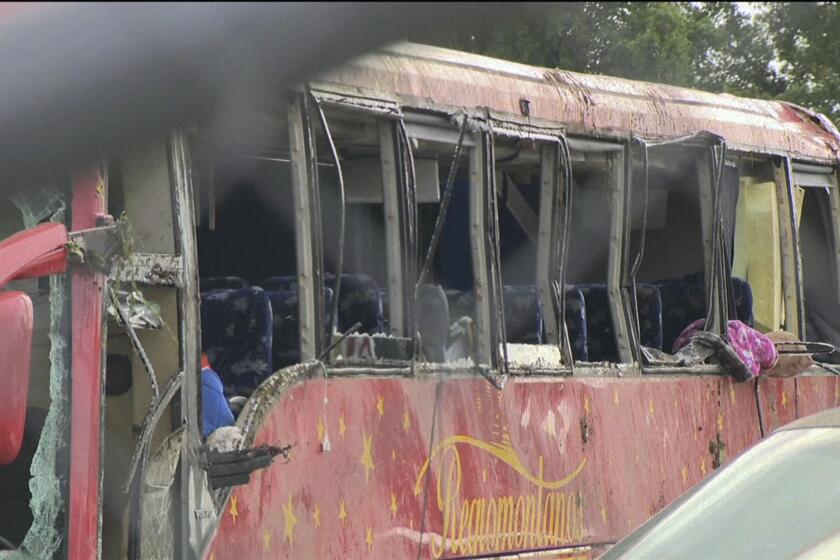Inaction and Protests Discomforting to Bonn
A chorus of voices across the German political spectrum Tuesday warned against a growing anti-Americanism that has accompanied large protests in the country against the Gulf War.
“We’re angry that the demonstrations are in part directed against the wrong people,” commented Juergen Englisch, spokesman for the 319 members of Parliament from Chancellor Helmut Kohl’s ruling Christian Democrats and its Bavarian sister party, the Christian Socialists. “We believe they should demonstrate, but against Saddam Hussein, the man who invaded a neighboring nation.”
Franz Steinkuehler, leader of the country’s powerful metalworkers’ union, which has supported the peace movement financially, also warned against blaming Americans for the war, while Foreign Minister Hans-Dietrich Genscher issued a strong, pro-American statement for the second time in two days.
The Atlantik-Bruecke (Atlantic Bridge) organization, which fosters German-American relations, also issued an appeal for solidarity with U.S., British, French and Canadian forces fighting in the gulf region.
The actions come amid a growing discomfort among the political leadership in Germany that the highly visible anti-American sentiment, coupled with the absence of any German forces in the U.N.-backed coalition, have unsettled relations between Germany and its key allies.
Many of those who spoke out blamed Kohl and Genscher for a drift into anti-Americanism by failing to exert stronger political leadership during the initial days of the war.
To many observers, they--as much of Germany--appear to have been paralyzed by events and focused almost exclusively on the possibility of being drawn into the war if Iraq should launch an attack on its northern neighbor Turkey, a NATO member.
Successive German governments have ruled that the country’s constitution prevents the deployment of German military forces outside the North Atlantic Treaty Organization region.
Kohl dispatched 18 Luftwaffe jet aircraft to Turkey earlier this month as part of a show of solidarity with the Ankara government. However, to ease public concern, he stressed at the time that the jets would be stationed 250 miles from the Iraqi frontier and had a combat range of only 155 miles.
The decision to rotate the crews back to Germany every two weeks makes them virtually useless militarily, according to defense analysts.
Apparently referring to Kohl, but not mentioning him by name, Atlantik-Bruecke Chairman Walther Leisler Kiep criticized the initial high-level expression of “deep dismay” made at the start of hostilities.
“What the hell is that?” Leisler Kiep said. “He’s not there to be ‘dismayed.’ He’s there to explain what has happened and what is to be done. A housewife can be ‘dismayed.’ ”
Hans-Hermann Tiedje, editor in chief of the mass-circulation Bild Zeitung, Europe’s largest daily paper, echoed a similar criticism against Kohl, Genscher and the country’s popular figurehead president, Richard von Weizsaecker.
“If Kohl had spoken to the people two weeks ago and said we’re on the side of the Americans and Genscher had done the same, we would not have the situation we have now,” Tiedje said. “There has been only total silence from Bonn.
“The silence of the three most important voices in Germany is unforgivable,” he added. “The damage is there; we won’t make it good in 10 years.”
German inaction in the present crisis is seen as especially embarrassing for many of those over 35 who have some memory of the hardest years of the Cold War, when soldiers from the same nations that are now fighting in the gulf guaranteed West Germany’s freedom.
Although U.S. military installations in Germany have been singled out for protests and many demonstrations have carried a distinctly anti-American flavor, public opinion polls have suggested that a large--albeit silent--majority of Germans support the coalition action in the gulf.
Observers believe that the anti-American nature of the demonstrations reflects the peace movement’s previous campaign to prevent the deployment of U.S. nuclear missiles in West Germany in the early 1980s.
The strong involvement of the political left and an ideological group of German young people are also seen as factors influencing the mood of demonstrators.
More to Read
Sign up for Essential California
The most important California stories and recommendations in your inbox every morning.
You may occasionally receive promotional content from the Los Angeles Times.






